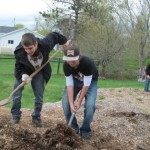Aaron and I from the Food Team traveled to Toronto April 1-3rd to join the Annual Food Summit hosted by Community Food Centres Canada. This summit is held for Community Food Centres across Canada and other Good Food Organizations (The Ecology Action Centre become a Good Good Organization last year). We walked away with a tonne of resources and inspiration from organizations across Canada. Below are two initiatives in Toronto that made me all tingly inside and wondered “could these happen back home?”
The Co-op Cred Program

How the Co-Op Cred Program Works (Co-op Cred Program, 2016)
The first day of the summit I joined a tour of two organizations in Parkdale Neighborhood that support food access for low income residents:
- The Parc: community hub whose mission is “A community where people rebuilt lives”. They work with their community members on issues about poverty, human rights, and healing and health.
- Greenest City: Focus on issues related to urban agriculture, environmental education, community engagement and a green economy.
These two organizations are only a few blocks away from each other and often serve the same community. Both organizations, along with the Parkdale Community Health Centre and the West End Food Co-op in Parkdale support the Co-op Cred Program.
The main goals of the program are (from http://www.coopcred.org/):
- Provide an alternative food purchasing benefit that increases access to healthy food;
- Support those with employment barriers to re-engage with work;
- Encourage increased skill building, critical consciousness, personal growth and leadership development
This program offers co-op credits to participants in exchange for their labor at places like community gardens with Greenest City and the West End Food Co-op. Participants can then use their credits in exchange for food at the West End Food Co-op or a local farmers market. This allows participants to gain valuable training and work experience while accessing healthy food, without losing social assistance eligibility (you can only work so many hours while on social assistance – a tricky balance for people who want work, but work that is available might be precarious or not enough to cover the bills). One Co-Cred Participant shared with us that being able to purchase food from the Co-op has made a big difference in her week to week. If she finds she doesn’t need the food one week, she’ll share food with others who do. Over $50,000 worth of fresh, healthy food has reached low-income households in their community since the program was established in 2013. I was inspired to say the least. Check out some great videos on their website: www.coopcred.org
Regional food terminals or hubs
Discussions about regional local food hubs are gaining traction in Nova Scotia – a place for local food to be distributed across regions, benefiting both farmer and consumer. Learning how organizations are taking advantage of food distribution hubs in Toronto highlighted the significance local food hubs could have not just for local businesses, but also for community organizations in Nova Scotia.
All food distributed in ON is first brought through the food terminal in Toronto. This was a constant thread through some of the programs I learned about during the summit. Through various partnership developments, non-profit groups in Toronto are able to purchase foods from the terminal at wholesale prices:
Taste of Regent Park in Regent Park purchases food direct from the food terminal to sell at the farmers market. This market includes a variety of local, organic and conventional produce that suits the diverse cultural preferences in their communities.
The Food Reach Program is soon to be launched through The Parc. This program will be an online platform that allows small organizations who typically don’t have a large enough orders for wholesale prices to collectively source from the food terminal. Foods ordered will be for food programming, community meals, and other organizational needs. The benefits: staff time saved on smaller trips to grocery stores, and healthy food at affordable prices.
~Jen Organ is the Community Food Programmer with the Our Food Project of the Ecology Action Centre.
Adventures in Local Food is your source for food news in Nova Scotia, from pickles to policy. It is a project organized by the Ecology Action Centre. Learn more about our program at https://www.ecologyaction.ca/ourfood. Follow us on Twitter @ourfoodproject.




